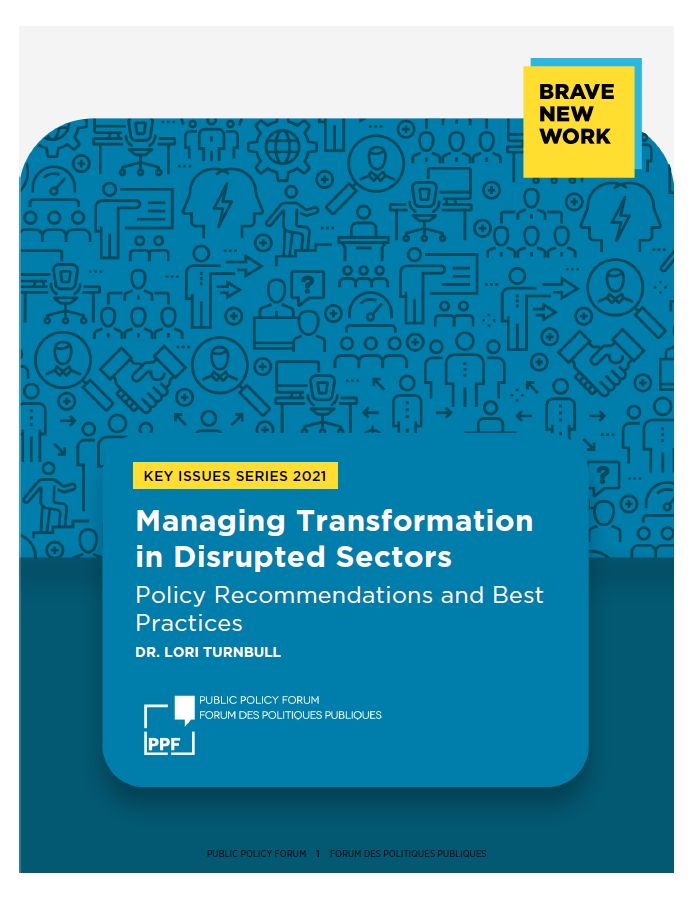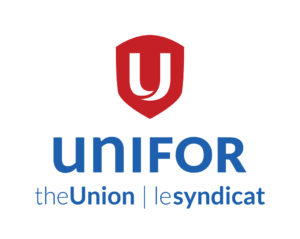
Managing Transformation in Disrupted Sectors
Series | Brave New Work Key IssuesIt goes without saying that the COVID-19 pandemic has disrupted and transformed our lives. How we live and work has changed, with many working from home — some permanently — and many sectors and industries facing prolonged disruption. Industries have been forced to either reimagine themselves or cease to exist and job losses have shocked the economy — in Ontario alone 355,000 jobs were lost in 2020. Yet the effects of this economic shock are not distributed equally across income brackets. A report by CIBC Economics showed job losses tended to be low-paying positions in the service industry, while higher-earning Canadians experienced net gains in employment.
As vaccines roll out across the country and we can start to think and plan more meaningfully around recovery, there is a critical need for public, private and not-for-profit partners to work together to build a new and resilient economy. This means developing co-ordinated plans for building new skills, recovering and/or reimaging sectors of our economy and redesigning social programs to meet the needs of workers and employers. Four key areas to consider are inclusive economic growth, how vulnerable sectors can reskill for future needs, the value of lifelong learning (and how educational institutions and employers can play a role in facilitating it), and how social programs can help industries, sectors and workers navigate economic disruption.
In order to build strong sectors and rebuild those sectors that are struggling, we need to understand how our work and lives have changed, and not just because of COVID-19. There was already a shift to more flexible work arrangements, the creation of social programs to provide support for a changing economy and workforce, and jobs eliminated or transformed by automation and artificial intelligence. At the same time, the proliferation of non-standard work and the gig economy means we can no longer assume a worker will pursue a unidirectional career path in a single sector or area of expertise. The changing nature of work means all sectors will need to undertake some degree of restructuring to attract talent and remain competitive. The pandemic both exposed and, in some cases, worsened inequities in our society. Knowing what we know now, there is an inescapable imperative to steer economic recovery and growth towards equity and inclusion.
Even before COVID-19, post-secondary institutions were under pressure to become more flexible and responsive to the needs of learners and employers. The transformation of work means learning and skills-building must evolve as well. The adoption of micro-credentials programming — defined as certification of assessed competencies that are additional, alternate, complementary to, or a component of a formal qualification — is one such way to address these needs. Another is through an employer-created ecosystem of shared training. Employers who make lifelong learning a priority by listening to employees and finding ways to engage them in training opportunities and career advancement are more likely to keep their best people. At the same time, there are lessons to be learned from industries that have survived and thrived through disruption, as well as those that have failed to navigate industry transformation. We need to learn from the past while we look for innovative ways of working together to rebuild the economy.
We need to plan for inevitable change as all sectors will need to adapt and change at some point.
To achieve these goals, we need to plan for inevitable change as all sectors, no matter how resilient, will need to adapt and change at some point to stay alive. Businesses and governments also need to take an inclusive approach to recruitment and hiring through data-driven practices to attract the broadest pool of talent. And it is important to bridge the gaps in the social safety net to catch those affected by the disruption that COVID-19 has caused. It is in our best interest to ensure workers can keep their jobs or are supported as they seek new opportunities, are recognized for their skill sets, and are offered training programs that lead to employment. With the right tools, workers, employers and sectors can fortify themselves in a new economy.

By Dr. Lori Turnbull
Read the ReportIssues in Action
For a deeper dive into the topics explored in this report, check out these case studies on transformation in disrupted sectors:
- Surviving Disruption in the Shipbuilding Industry, by Dr. Sherry Scully
- Commitment to lifelong learning is win-win for manufacturing company AVIT and its employees, by Daniel Squizzato
Thank you to our partners
Thank you to our lead sponsor

Thank you to our partners
 |
 |
 |
 |
 |
 |
 |
 |
 |








